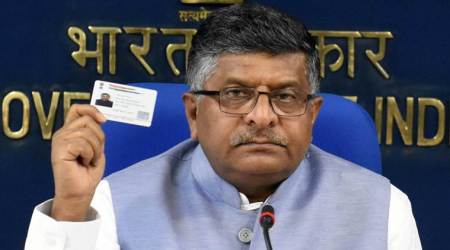 The judgment did underline that “digital platforms are a vital tool of ensuring good governance in a social welfare state” — this has been the thrust of the government’s explanation for its Aadhaar move.
The judgment did underline that “digital platforms are a vital tool of ensuring good governance in a social welfare state” — this has been the thrust of the government’s explanation for its Aadhaar move.
In a landmark verdict delivered unanimously by a nine-judge Constitution Bench, the Supreme Court Thursday ruled that individual privacy is a fundamental right. The ruling will impact daily lives of the people since it has implications for matters ranging from collection and sharing of personal data to the government’s move to make Aadhaar mandatory for benefits of social welfare schemes to criminalisation of homosexuality.
Overruling two earlier verdicts which held that right to privacy was not protected by the Constitution, the bench of Chief Justice of India J S Khehar, Justices R K Agrawal, S Abdul Nazeer, D Y Chandrachud, J Chelameswar, S A Bobde, A M Sapre, Rohinton F Nariman and S K Kaul ruled that “the right to privacy is protected as an intrinsic part of the right to life and personal liberty under Article 21 and as a part of the freedoms guaranteed by Part III of the Constitution”.
The orders — there were six in all — made it clear that this right could not be absolute and would be “subject to the restrictions specified”. Justice Chandrachud wrote for himself, Chief Justice Khehar and Justices Agrawal and Nazeer while the remaining five wrote their own orders.
The judges rejected the government’s contention that privacy was already protected by various statutes, and that there was no need to elevate it to a fundamental right status. “The submission betrays lack of understanding of the reason why rights are protected in the first place…The purpose of infusing a right with a constitutional element is precisely to provide it a sense of immunity from popular opinion and, as its reflection, from legislative annulment.”
Justice Kaul said: “It is a right which protects the inner sphere of the individual from interference from both State and non-State actors and allows the individuals to make autonomous life choices… Let the right of privacy, an inherent right, be unequivocally a fundamental right embedded in Part III of the Constitution of India, but subject to the restrictions specified, relatable to that part. This is the call of today. The old order changeth yielding place to new.”
Spelling out what constitutes privacy, Chief Justice Khehar, Justices Agrawal, Chandrachud and Nazeer said: “Privacy includes at its core the preservation of personal intimacies, the sanctity of family life, marriage, the home and sexual orientation. Privacy also connotes a right to be left alone… Personal choices governing a way are intrinsic to privacy. Privacy protects heterogeneity and recognises the plurality and diversity of our culture.”
“While the legitimate expectation of privacy may vary from the intimate zone to the private zone and from the private to the public arenas, it is important to underscore that privacy is not lost or surrendered merely because the individual is in a public place. Privacy attaches to the person since it is an essential facet of the dignity to the human being,” the judges said, adding even “silence postulates a realm of privacy”.
Agreeing that “no legal right can be absolute” and “every right has limitations… to be identified on case-to-case basis depending upon the nature of the privacy interest claimed”, Justice Chelameswar underlined: “All liberal democracies believe that the State should not have unqualified authority to intrude into certain aspects of human life and that the authority should be limited by parameters constitutionally fixed. Fundamental rights are the only constitutional firewall to prevent State’s interference with those core freedoms constituting liberty of a human being. The right to privacy is certainly one of the core freedoms…”
Pointing out that privacy is the necessary condition precedent to the enjoyment of any of the guarantees in Part III, Justice S A Bobde wrote “Article 28 (3) expressly recognises the right of a student attending an educational institution recognized by the state, to be left alone. Such a student cannot be compelled to take part in any religious instruction imparted in any such institution unless his guardian has consented to it… The right of privacy is also integral to the cultural and educational rights whereby a group having a distinct language, script or culture shall have the right to conserve the same”.
Noting that “privacy has both positive and negative content”, Chief Justice Khehar, Justices Agrawal, Chandrachud and Nazeer said: “The negative content restrains the State from committing an intrusion upon the life and personal liberty of a citizen. Its positive content imposes an obligation on the State to take all necessary measures to protect the privacy of the individual.”
The judges emphasised to the Centre “the need to examine and put into place a robust regime for data protection. The creation of such a regime requires a careful and sensitive balance between individual interests and legitimate concerns of the State. The legitimate aims of the State would include, for instance, protecting national security, preventing and investigating crime, encouraging innovation and the spread of knowledge, and preventing the dissipation of social welfare benefits”.
The judgment did underline that “digital platforms are a vital tool of ensuring good governance in a social welfare state” — this has been the thrust of the government’s explanation for its Aadhaar move. “Besides national security, the State may have justifiable reasons for the collection and storage of data. In a social welfare state, the government embarks upon programmes which provide benefits to impoverished and marginalised sections of society. There is a vital State interest in ensuring that scarce public resources are not dissipated by the diversion of resources to persons who do not qualify as recipients. Allocation of resources for human development is coupled with a legitimate concern that the utilisation of resources should not be siphoned away for extraneous purposes.”
“Data mining with the object of ensuring that resources are properly deployed to legitimate beneficiaries is a valid ground for the State to insist on the collection of authentic data. But the data which the State has collected has to be utilised for legitimate purposes of the State and ought not to be utilised unauthorisedly for extraneous purposes…,” the bench stated.
The judgment was limited to the issue of right to privacy. The matter whether Aadhaar violates the right to privacy will be dealt with by the five-judge bench hearing the petitions since 2015. The nine-judge bench was constituted after judges noted that two earlier judgements of the court — M P Sharma’s case in 1954 and Kharak Singh’s case in 1962 — had held that privacy was not a fundamental right. The Constitution Bench had to decide the correctness of the two verdicts.

